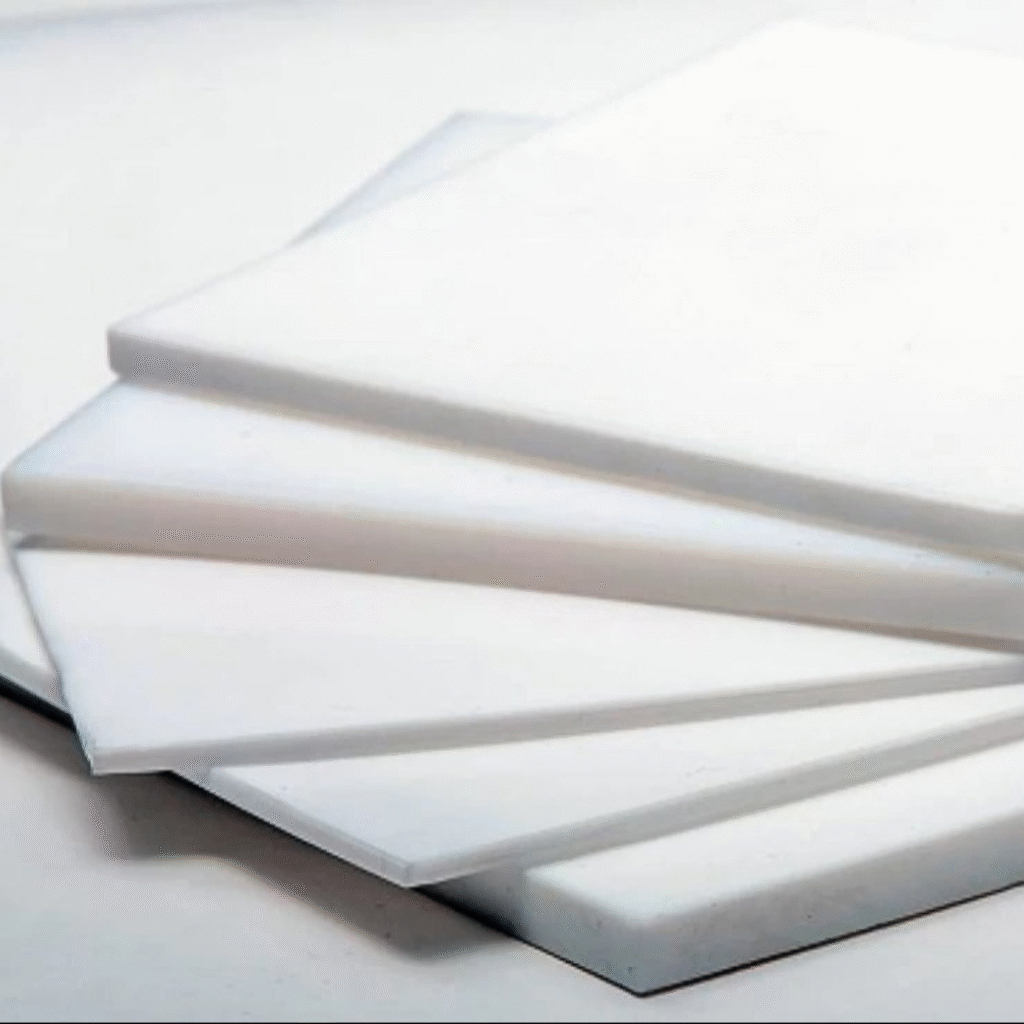Carbon-Filled PTFE
Carbon-filled PTFE is a type of plastic produced by mixing carbon particles into PTFE (Polytetrafluoroethylene), also known as Teflon. PTFE is known to be nonstick and slippery and has high resistance to heat and chemicals. Carbon adds strength, makes it wear resistant, and is now an electrical conductor.

Durability and Long Lifespan

High-Temperature Resistance

Non-Stick Properties

Electrical Insulation
Carbon-filled PTFE is a PTFE product with carbon fill that is produced by loading carbon particles of various amounts into PTFE to obtain proper strength, conductivity, and durability. Mainly, it contains 25% of carbon, but it varies as per the needs.
Together, both materials make the base material more able to resist wear and deformation. Despite the addition of carbon, the PTFE retains its original properties such as excellent chemical resistance, high-temperature stability, and a low-friction surface.
There are sheet, rod, washer, gasket, and valve sheet forms, all of which are suited to many industrial applications. Mechanical and electrical workplaces where components face strong pressure, friction, or heat are especially suitable for them. Due to its improved mechanical strength and dimensional stability, it is ideal for use in harsh environments that virgin PTFE can’t adhere to.
Therefore, carbon-filled PTFE is a proven material in various sectors such as aerospace, automotive, electronics, and chemical processing. This is useful in extremely tough industrial conditions where PTFE will not work well for certain applications.
There are some unique features associated with Carbon Filled PTFE. Let’s divide them between strengths and weaknesses.
- Tougher and Stronger: Carbon makes PTFE tougher and can take heavier loads.
- Longer Lasting: The resistant parts are better because they last longer in high-friction applications like moving parts.
- Lower Thermal Expansion: It expands less as the temperature goes up, which is important to precision machinery.
- Chemical Resistance: Still resists most chemicals like normal PTFE.
- Electrical Conductivity: Carbon-filled PTFE is an electrical conductor that is useful in electronic components.
- Less Cold Flow/Cold Flow: It holds its shape better under pressure over time.
Here are some general technical details of Carbon-Filled PTFE. (Note: Exact numbers may vary depending on the carbon content and manufacturer.)
Property | Typical Value |
Carbon Content | 5% to 35% |
Operating Temperature | -200°C to +260°C |
Density | 2.05 to 2.20 g/cm³ |
Tensile Strength | 15 to 25 MPa |
Hardness (Shore D) | 60 – 70 |
Thermal Conductivity | Higher than virgin PTFE |
Electrical Conductivity | Conductive to semi-conductive |
Chemical Resistance | Excellent (slightly reduced vs PTFE) |
Design Considerations & Material Variability
For Carbon Filled PTFE, you should take into consideration:
- Wear Resistance: Usually, more carbon equates to better wear resistance, but less chemical resistance.
- Form and Shape: Choose sheets, rods, gaskets, or more depending on your requirements.
- Load and Temperature: Make sure it matches the expected operating load and temperature.
- Texture: A rougher texture may need post-finishing for precision parts.
Typical Applications Across Industries
Carbon-filled PTFE is used all the time in various industries where the need for these properties plays a key role.
- Automotive: Used in gaskets, seals, and bushings where heat and friction are high, and also for sealing out heat and friction in conveying systems.
- Aerospace: Good for parts that can endure high pressure and temperature.
- Electronics: Used in components that require a material that can conduct electricity and resist heat.
- Chemical Processing: Great for pump parts, valve seats, and seals in aggressive chemical environments.
- Pharmaceuticals and Food Processing: Used where hygiene and chemical resistance are important.
- Heavy Machinery: Bearings, piston rings, and sliders that endure constant wear and tear.
Why Choose Hindustan Polymer Carbon-Filled PTFE?
We, at Hindustan Polymer, have years of experience in providing high-quality carbon-filled PTFE products. Here’s why customers prefer us:
- Reliable Quality: We use only premium raw materials to meet and deliver. Before it gets to you, every product is also subjected to strict quality checks.
- Wide Range of Products: Carbon-filled PTFE products are available in the form of sheets, rods, gaskets, washers, and many other shapes. All you need is available.
- Customisation Available: Every project is different, and we understand this, so we provide tailored solutions. We can adjust our products from size and shape to carbon content according to your needs.
- Affordable Pricing: We provide high-quality industrial materials at prices to meet your budget. We are transparent and competitive in pricing without impacting quality.
- Quick Delivery: Our processing and delivery of orders is particularly faster to meet your deadlines. We offer shipping services to all of India and international destinations.
- Technical Support: We have an experienced team that will always guide you to choose the right material. All in all, we help you to match the product with the application’s requirements.
FAQs on Carbon-Filled PTFE
The virgin PTFE provides excellent chemical resistance and low friction, it has limitations in strength and resistance to wear. Adding carbon improves these mechanical properties, reduces deformation under the load, introduces electrical conductivity, and expands its range.
Yes, incorporating carbon particles provides electrical conductivity to PTFE, which makes it suitable for applications requiring stable dissolution or grounding. This property is beneficial in an electronic and electrostatic-sensitive environment.
Yes, carbon-filled PTFE can be mechanised with standard devices. It offers to wear less equipment during machining processes, contributes to cost-effective manufacturing and accurate component construction.
Yes. The Virgin PTFE is FDA-transcendent for food contact, and can affect compliance in addition to carbon filler. It is necessary to verify the suitability of a specific grade for food-grade applications with the manufacturer.
Yes, carbon-filled PTFE retains excellent chemical resistance, making it ideal for use in corrosive environments such as chemical processing plants and laboratories.
Related PTFE Materials
Depending on your needs, we can provide you with different types of carbon-filled PTFE products. Here’s a quick look

Carbon-Filled Valve Sheet
Carbon-filled sheets are specially designed to resist high pressure and high temperatures for industrial valve systems. These deliver the ability to seal excellently, reduce friction, and increase the life of valves used in harsh environments.

Carbon-Filled Washer
Our carbon-filled PTFE washers are applied to joints to protect from stress and leakage. In static and moving assemblies, they provide great insulation, mechanical strength, and wear resistance.

Carbon-Filled Sheet
We also provide carbon-filled sheets of varying thickness available in a large variety of thicknesses that can be cut or machined to create your own custom parts. Applications include gaskets, seals, and liners that require strength, wear resistance, and chemically durable operation.

Carbon-Filled Rods
Solid, round carbon-filled PTFE rods that are easy to shape into the form of mechanical parts such as the bushings, rollers, and spacers. They are tough, very long-lasting, and they work well under high heat and pressure.

Carbon-Filled Gasket
Carbon-filled gaskets are good for sealing joints in areas of high stress, such as pipes, pumps, equipment, and other chemical equipment. They resist chemical corrosion, handle high temperatures, remain in shape when compressed, and seal tightly.
